

Celtic mythology. Overview[edit] Though the Celtic world at its apex covered much of western and central Europe, it was not politically unified nor was there any substantial central source of cultural influence or homogeneity; as a result, there was a great deal of variation in local practices of Celtic religion (although certain motifs, for example the god Lugh, appear to have diffused throughout the Celtic world).
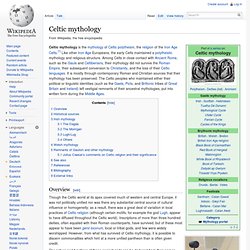
Inscriptions of more than three hundred deities, often equated with their Roman counterparts, have survived, but of these most appear to have been genii locorum, local or tribal gods, and few were widely worshipped. However, from what has survived of Celtic mythology, it is possible to discern commonalities which hint at a more unified pantheon than is often given credit. Celtic mythology is found in a number of distinct, if related, subgroups, largely corresponding to the branches of the Celtic languages: Historical sources[edit]
Hebridean mythology and folklore. The Inner and Outer Hebrides off the western coast of Scotland are made up of a great number of large and small islands.
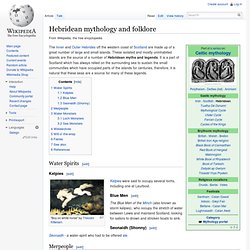
These isolated and mostly uninhabited islands are the source of a number of Hebridean myths and legends. It is a part of Scotland which has always relied on the surrounding sea to sustain the small communities which have occupied parts of the islands for centuries, therefore, it is natural that these seas are a source for many of these legends. Water Spirits[edit] Kelpies[edit] Kelpies were said to occupy several lochs, including one at Leurbost. Blue Men[edit] The Blue Men of the Minch (also known as storm kelpies), who occupy the stretch of water between Lewis and mainland Scotland, looking for sailors to drown and stricken boats to sink. Seonaidh (Shonny)[edit] Seonaidh - a water-spirit who had to be offered ale.
Merpeople[edit] It has been claimed that there is a mermaid's grave in Benbecula, but the exact location is unknown. Water Monsters[edit] Loch Monsters[edit] Irish mythology. Bunworth Banshee The mythology of pre-Christian Ireland did not entirely survive the conversion to Christianity.
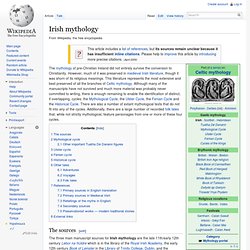
However, much of it was preserved in medieval Irish literature, though it was shorn of its religious meanings. This literature represents the most extensive and best preserved of all the branches of Celtic mythology. Although many of the manuscripts have not survived and much more material was probably never committed to writing, there is enough remaining to enable the identification of distinct, if overlapping, cycles: the Mythological Cycle, the Ulster Cycle, the Fenian Cycle and the Historical Cycle. There are also a number of extant mythological texts that do not fit into any of the cycles.
Scottish mythology. Scottish mythology may refer to any of the mythologies of Scotland.
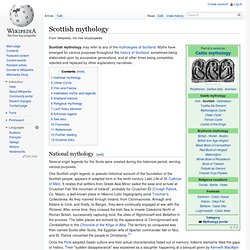
Myths have emerged for various purposes throughout the history of Scotland, sometimes being elaborated upon by successive generations, and at other times being completely rejected and replaced by other explanatory narratives. National mythology[edit] Several origin legends for the Scots were created during the historical period, serving various purposes. One Scottish origin legend, or pseudo-historical account of the foundation of the Scottish people, appears in adapted form in the tenth-century Latin Life of St. Cathróe of Metz. Welsh mythology. The prose stories from the White and Red Books are known as the Mabinogion, a title given to them by their first translator, Lady Charlotte Guest, and also used by subsequent translators.
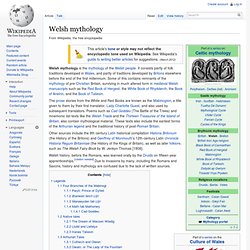
Poems such as Cad Goddeu (The Battle of the Trees) and mnemonic list-texts like the Welsh Triads and the Thirteen Treasures of the Island of Britain, also contain mythological material. These texts also include the earliest forms of the Arthurian legend and the traditional history of post-Roman Britain. Other sources include the 9th century Latin historical compilation Historia Britonum (the History of the Britons) and Geoffrey of Monmouth's 12th-century Latin chronicle Historia Regum Britanniae (the History of the Kings of Britain), as well as later folklore, such as The Welsh Fairy Book by W. Jenkyn Thomas [1908]. Welsh history, before the Romans, was learned orally by the Druids on fifteen-year apprenticeships. Celtic.